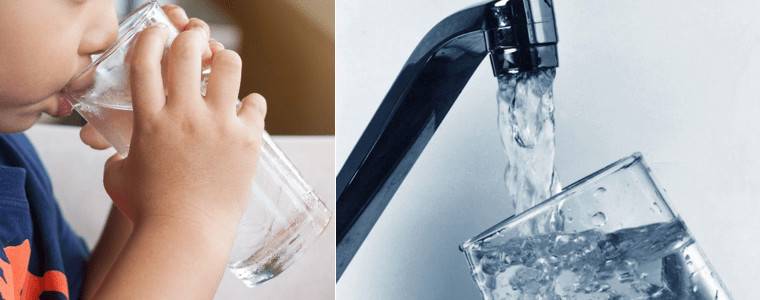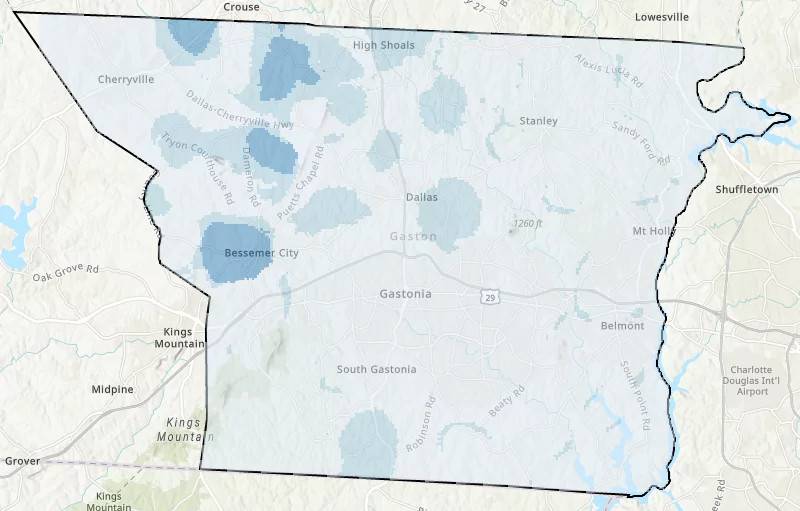What's in your water?
- Over 42% of households in Gaston County currently rely on private wells as their primary source of drinking water.
- These wells are unmonitored, so it’s up to you to protect yourself with testing and information.
- Exposure to contaminated groundwater poses a significant health risk to rural populations, especially children.

The first goal of Gaston Water Map is to inform and improve awareness for residents served by private potable wells as to the quality of their drinking water. The second goal is to encourage regular well testing as a way to reduce health risks.
About 42% of Gaston County residents get their drinking water from private wells. While public water supplies are protected under State and Federal regulations, private well owners are responsible for monitoring the quality of their own well water and for maintaining their own wells. Drinking water can be contaminated by natural sources, like bedrock, or from man-made sources, like agricultural run-off, waste sites, disinfection chemicals, or plumbing fixtures. Regular water testing is an important step that private well owners can take to ensure that their water supply is both safe to drink and appealing to use.
Frequently Asked Questions
Most frequent questions and answers
Why should I test my private well water?
- To ensure your water is safe to drink. Your water may appear fine. Regular testing can help identify the presence of contaminants in your water supply which could go unnoticed or to ensure your water treatment is working effectively.
- If there is known or suspected well water contamination in your area. If your well is susceptible to contamination see the next page for more information.
- Does your water have unpleasant taste, smell, or appearance? Testing will help you identify contaminants and select proper treatment methods.
- At real estate transactions or installations of new wells.
What contaminants may be in my well water?
- There are many substances that can negatively affect the quality of your well water and your health. Some are found naturally in the environment while others result from human activities.
- The two most common types of well water contaminants in Gaston County are:
-
-
- Arsenic which is largely naturally occurring from the rock formations and,
- Infectious microorganisms such as bacteria and viruses, which are found in human and animal feces. We test for the presence of Coliform bacteria as an indicator of potential fecal contamination.
-
How can these contaminants affect my health?
- Arsenic may increase the risk of lung, bladder, and skin cancer.
- Infectious microorganisms (Coliform) can cause nausea, vomiting, diarrhea, and stomach cramps.
- Lead can cause learning, behavioral, and developmental problems in infants and children.
- Nitrates can interfere with the blood’s ability to carry oxygen resulting in a type of anemia called methemoglobinemia, especially in infants.
How often should I test my well water?
- You must test your well when required by Gaston County. In addition, well owners are encouraged to test as follows:
- Every year (at least): Coliform, nitrates
- 5 years: Lead, arsenic
What should I do if contaminants are found in my well water?
- If contaminants are found, you may want to retest your well water to make sure that the first sample was collected and analyzed properly. If contaminants are found above federal and state public drinking water standards, you should take steps to reduce contaminant levels in your well water.
-
Corrective actions should be selected based on the contaminants of concern and the source of contamination. Some actions are intended for short- term use while others are permanent or long-term solutions.
-
- Install a home water treatment device
- Install a new and/or deeper well
- Repair and/or maintain your septic system
- Connect to a nearby public water supply
-
-
Where can I learn about water treatment?
-
Effective treatment devices will reduce contaminant levels in your drinking water. Both point-of-entry (POE, whole-house) treatment systems and point-of-use (POU, single-tap devices) are available. These devices will vary depending on your water quality and the contaminant detected in your water. Local water treatment companies may be a good resource. There are no State regulations for water treatment professionals in New Jersey. You should get quotes and information from several companies.

Our Team
Gaston County Department of Health and Human Services, UNC Charlotte, and UNC Chapel Hill have partnered to offer this service through funding from the Water Resources Research Institute.
GastonWaterMap is part of Gaston County DHHS’ mission to inform your healthcare decisions. There is no obligation to participate, and we will never retain your information without your express permission.
